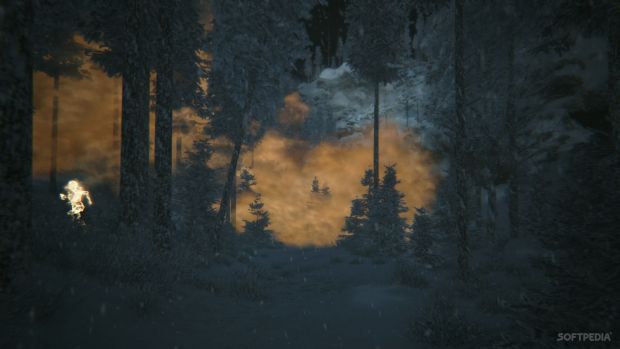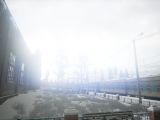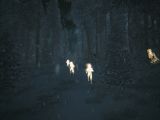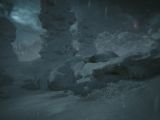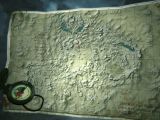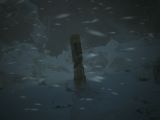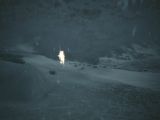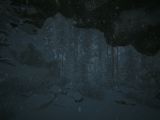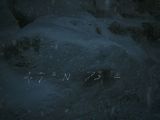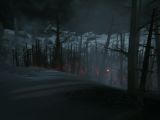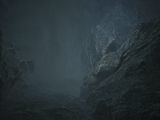Kholat is a game about walking in the snow for long periods of time, trying to find out where you are and how you can get to a new location where a valuable bit of new story might be found.
The development team at IMGN.PRO has taken an interesting situation and a very rugged location and turned them into a video game that shows just how vulnerable and lost a human being can be when faced with the power of both nature and forces that operate outside it.
Kholat is not a very terrifying horror experience, although a sense of unease runs through it, and has some problems when it comes to the core exploration mechanics, but for gamers interested in mysteries it can deliver some very engaging moments that can be both scary and delightful.
Story
Kholat is based on some real life events that are still shrouded in mystery, even if they took place more than 50 years ago.
A group of ten experienced skiers and cross-country explorers led by Igor Alekseievich Dyatlov were planning to move across the Northern Ural mountains as they tried to reach Otorten, moving across inhospitable terrain and with bad weather surrounding them.
When no news was received from the group, which had one of its members return because of illness, a search party was sent to find them.
The bodies of those involved were found, and the investigation launched by the Soviet authorities concluded that no human force could have caused their deaths.
A tent was cut from the inside, a group fled in panic, but with no resources to survive, four of the bodies were severely injured and their clothes were apparently irradiated while glowing lights were seen in the sky.
All of this could be explained rationally, but for the team at IMGN.PRO in charge of Kholat, the incident becomes the basis for a title that mixes horror and exploration in interesting ways, with a narration delivered by Sean Bean.
The story of the title is delivered via notes that gamers can find when moving through the world and from the relatively cryptic voice over.
The development team is not interested in offering a full explanation for the events, and gamers are free to create their own theory about what happens, although there's a clear pressure to consider supernatural elements.
Kholat is interesting because it takes real world events and creates gameplay around them, but there are moments when the narrative feels a little too thin to support the entire experience.
Gameplay
Kholat is a title about walking, dying and trying to make sense of things, but the actual gameplay mechanics are only designed to focus on the first two elements of the experience.
Dear Esther is the best-known representative of the genre, but the development team at IMGN.PRO does have the advantage of working based on a real world incident and location.
Gamers will start off in a train station, trying to make sense of the world around them, deciding which direction looks the more promising when it comes to exploration and dealing with the narrator's voice and the implications of what he is saying.
Soon, they are lost on the mountain where the Dyatlov expedition disappeared, and the game only offers a basic map, a compass and a light source as tools that gamers can use to find their way around.
The developers clearly want the player to feel lost and mostly helpless, and initially it's interesting to explore this setup and to try and find reliable ways to make progress and discover more notes that offer narrative progress.
The biggest disappointment is that there's no way for the protagonist to jump or to climb over low obstacles, which feels unnatural and means that Kholat can force players to turn back and find new routes even if the rocks that block their path are just half a meter tall and could be easily traversed.
The mountain is filled with normal danger, although the cold does not have a clear effect on the main character, but it is also home to supernatural phenomena, which are signaled by the use of the color orange.
“There are ghostly figures that sometimes move around and seem not to notice the presence of an outsider, but there are also moments when they simply focus on the player and quickly move to kill him.”
The only way to escape them is to run, because Kholat does not actually feature a way for the gamer to fight back, but because sprinting is limited, almost any encounter with them seems to end poorly.
The fact that supernatural presences are powerful enough to detect and kill humans in a rough environment almost at will is a choice I can understand, and it has some interesting narrative implications, but it also makes the game feel unfair.
I suspect a lot of players will not have the patience required to gather the story elements without quitting in frustration.
Graphics and audio
Kholat looks good, even if it is a limited game by design when it comes to the kinds of sights that it shows to the player, and much of the quality is linked to the solid use of the new Unreal Engine 4 technology.
The team at IMGN.PRO does a good job of capturing the look of the mountains, and the use of a mix of white, blue and orange as the main colors in the video game can create both a feeling of quietness as gamers move around and one of fear when they meet something that is clearly out of place.
Kholat is a title about movement and that means gamers will spend a lot of time looking at landscapes, trying to determine where they should go and whether a particular landscape feature is a point of interest or a potential threat.
There's plenty of beauty in the title, but there are moments when the woods can become boring and oppressive, the kind of location that some gamers might only be able to explore for a limited time before trying another type of experience.
The sound design in Kholat is great and manages to make the story even more affecting, with the developers managing to carefully reproduce the sounds of the wild while adding an edge of supernatural that's really subtle.
The soundtrack also has some great moments, and I am convinced that it could also work for a stage adaptation of the events around the Dyatlov Pass.
The Good
- Story premise
- Environmental simulation
The Bad
- Limited character mobility
- Story does not evolve
Conclusion
Unfortunately, the developers have failed to find a way to keep interest up in the long term, and the inability to move at will across the landscape and the limited functionality associated with the map quickly become frustrating.
The fact that the story of Kholat is based on real life events acts as both a positive and negative element for the game.
On the one hand, it means that it's easy for players to become immersed in the world, and there's a clear mystery that they are hoping to unravel.
On the other hand, Kholat fails to offer answers to all the questions the situation raises, and it's hard to love the game when it does not fully deliver from either a gameplay or a story perspective.
 14 DAY TRIAL //
14 DAY TRIAL // 
